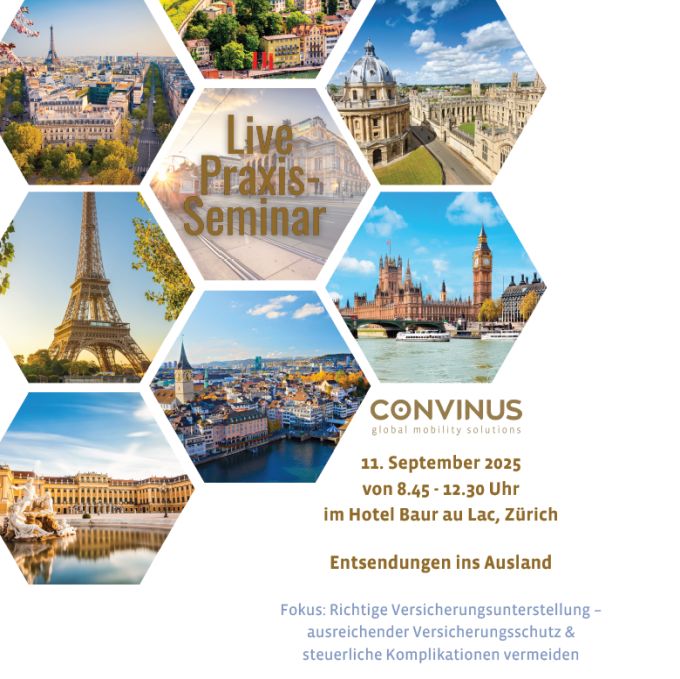- within Immigration topic(s)
- within Immigration topic(s)
- with readers working within the Securities & Investment industries
- within Technology topic(s)
For the German version, please read here>>
Switzerland and the EU began their bilateral approach within the framework of the Agreement on the Free Movement of Persons concluded in 1999. A lot has changed in the meantime, including the adoption of EU Directive 2004/38/EC (EU Citizens Directive) in 2004, so it makes sense to update the Agreement on the Free Movement of Persons.
The new agreement incorporates part of the EU Citizens Directive, although the agreement will continue to focus on labour migration. Furthermore, the safeguard clause will be concretised.
This offers plenty of "discussion material" not only at a political level.
What would the new Agreement on the Free Movement of Persons with its amendments mean for Switzerland based on current knowledge?
- Expulsion from the country: As an exception, offenders can still be expelled from Switzerland in accordance with Swiss legislation.
- Permanent residence: The right of permanent residence should still only be granted to gainfully employed persons and their family members.
- Withdrawal of the right of residence: Persons who have become involuntarily unemployed and do not make efforts to integrate into the labour market may have their right of residence withdrawn. This also means that if EU nationals have not found a new job within 6 months of the expiry of their unemployment benefit and cannot prove that they will find a job in the foreseeable future, their right of residence may be withdrawn. This also applies to their family members.
- Cross-border commuters: You will continue to receive a special certificate and the definition of a cross-border commuter (e.g. return to your place of residence at least once a week) will not change.
- Property acquisition: Property acquisition remains possible for "personal use", but prohibited for speculative or investment purposes.
- Biometric identity cards: Swiss citizens are free to apply for these, but must bear in mind that after an 11-year transition period, travelling in the EU with a non-biometric identity card will no longer be possible. In Switzerland, on the other hand, this will still be possible.
- Settlement permit C: A minimum period of 5 years will now apply for all EU nationals to obtain a settlement permit. Today, the minimum period for some was still 10 years. In the EU, a minimum period of 5 years also applies for Swiss nationals to obtain a permanent settlement permit.
- Protection clause: The requirements for the cancellation of the protection clause, the taking of any protective measures as well as the responsibilities and the procedure are specified in the Foreign Nationals and Integration Act (FNIA). Thresholds are defined in the following areas, which are examined for the triggering of the protection clause: Net immigration, cross-border commuter employment, unemployment and receipt of social assistance. The following defined indicators are added: immigration, labour market, social security, housing, transport. Before activating the safeguard clause procedure with the EU, the Federal Council consults the parliamentary committees, the cantons and the social partners. Furthermore, the safeguard clause is specified in the Agreement on the Free Movement of Persons and the safeguard clause can then be activated in the event of serious economic or social problems arising from the free movement of persons.
- "Joint Committee" / Court of Arbitration: As a first step, Switzerland must explain in a so-called "Joint Committee" why protective measures or the safeguard clause should be applied. If no agreement is reached in this "Joint Committee", the matter can be referred to the Court of Arbitration, which will examine the requirements accordingly. Switzerland can take protective measures irrespective of a positive or negative decision. If the EU has the impression that there is an imbalance of rights and obligations between Switzerland and the EU or the individual member states, even if there is a favourable decision by the arbitration tribunal, the EU can take appropriate compensatory measures. In the event of a negative ruling by the arbitration tribunal, the EU may initiate dispute settlement proceedings and take compensatory measures if it is felt that the measures violate the Agreement on the Free Movement of Persons.
- Ordinary procedure / urgent procedure: The ordinary procedure provides for a consultation period of 60 days before the arbitration tribunal can be called upon. In urgent proceedings, 30 days are granted for this , whereby the protective measures can already be taken within this period. The arbitration tribunal is given a timeframe of 6 months in which to reach a decision.
Conclusion
Switzerland is still dependent on the immigration of skilled labour from the EU and also needs a simple procedure to make it an attractive location. On the other hand, there should be a way to counteract this in difficult times. It appears that this issue has been taken into account accordingly with the update of the Agreement on the Free Movement of Persons. Once the Switzerland-EU package has been initialed by both parties in Bern on 21 May 2025, the Federal Council will decide in the summer whether to approve the agreements, open the consultation process and publish the texts.
The content of this article is intended to provide a general guide to the subject matter. Specialist advice should be sought about your specific circumstances.


